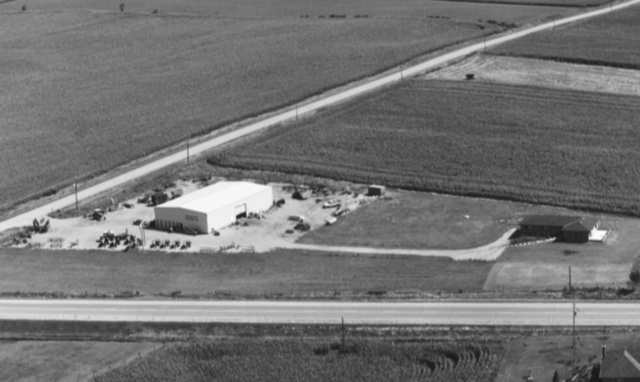Since 1978, Salford Group has been proudly meeting the needs of local growers. The company has grown over the years, expanding production facilities across North America, but the grassroots approach to designing solutions-based equipment for localized growing regions hasn’t changed. “The company got its start manufacturing conventional tillage equipment in Ontario to support local growers,” says Brad Baker, Salford Group VP of Sales and Manufacturing. “And we continue to stay in tune with grower needs today, consulting with our customers and neighbors to deliver solutions for their farm businesses.” Today, Salford Group has four manufacturing facilities in North America – Iowa, Georgia, Ontario, and Manitoba. Each facility is strategically located to support growers in these regions. Employing more than 500 staff, Salford invests in staff who know the environmental and growing challenges of the area, understand the needs of neighboring growers, interact regularly with customers and retailers, and in many cases, have a personal farm or equipment operator background. “Our manufacturing process is designed to be flexible and to accommodate our customers,” says Baker. “Everyone at Salford understands how our actions affect growers and retailers – from our service personnel to our parts manufacturing team – we all appreciate the importance of timely deliveries, quality construction, and value.”
THE VALUE OF CUSTOMER CONTRIBUTION
Baker believes that as an equipment manufacturer, it’s important for the company to be immersed in their market segment, understanding regional needs, growing seasons, and challenges. “We look to our customers for inspiration and improvement ideas. Two-way communication is essential to understanding and identifying what a grower needs so we can equate that into an opportunity for us to manufacture a solution for them.” The company engages growers at every step of the process – from the first idea and product innovation to the development and engineering process. And growers are key to Salford’s rigorous product testing process. “Whether we’re tweaking an existing machine or working on a new line, we rely on growers in their respective growing regions to help us come to the market with confidence,” says Baker, explaining the challenges of serving the North American market means creating equipment suitable to meet diverse growing and environmental conditions. “We make sure to test our equipment in the same regions we are producing the machines for.” Field testing is conducted with growers and retailers who are willing to experience the challenges of working with early concepts. At the same time, they can reap the rewards of early access to technology. Baker says it’s important to get as many field acres on each new prototype to test for the quality and durability Salford customers have come to expect with each new machine or innovative solution. “Our product development team and engineers are also engaged in field testing with our customers, providing another opportunity for customer input and ideas.”
MARKET RECOGNITION AND BRAND LOYALTY
Salford was one of the earliest to market with vertical tillage tools, a true testament to the company’s solutions-based approach. In fact, the company blazed such a trail in the vertical tillage segment that there are growing regions that refer to operating vertical tillage equipment as ‘Salfording’. Baker proudly says “that recognition sums up our reputation and customer brand loyalty.”
The development of Salford’s first vertical tillage equipment lineup came from a customer approximately 20 years ago. Baker says the company was working directly with local farmers in Ontario who were dealing with the problem of increasing crop residue. The amount of residue had grown over the years as a result of improved plant genetics, leaving excess stalks and leaves that were hard to break down and incorporate into the soil. The company worked closely with a local farmer who proposed to slice through the crop residue rather than disrupt the soil by working it into the field. “The challenge was to design a tool that balances the establishment of next year’s crop while minimizing soil disruption,” explains Baker. Salford developed a vertical tillage concept with a local grower to help overcome what they thought was a regionalized problem. They quickly realized growers across Canada and the U.S. were dealing with the same challenges and launched the new innovation across North America to the enthusiastic response of growers.
WHAT IT MEANS TO MANUFACTURE IN NORTH AMERICA
“Investing in a Salford machine means you have the support of a local company,” says Baker. Salford’s manufacturing facilities are strategically located close to their customer base. That makes for closer customer connections, the ability to build stronger relationships with dealers and customers, enhanced customer service, and a deeper understanding of local growing conditions and challenges. It also means Salford has the flexibility to engineer products to meet the changing needs of the local market and keep their costs manageable. Shorter distances from the manufacturing plant to the customer reduces delivery cost, time, and carbon footprint. Close proximity to customers also provides shorter lead times for machines and parts. “Our goal is to build on the success of our brand and continuously improve,” says Baker. “That also extends to supporting our customers and local communities by investing in the sustainability of our local agricultural regions and offering rewarding employment opportunities.”
